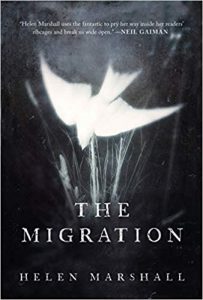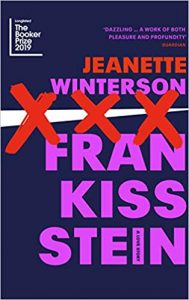Year in Review 2019 by Ian Mond

This was my first full year reviewing books for Locus. I’ve enjoyed every minute of it, even the yawning, anxiety-inducing depth of the white screen as I desperately cobbled together something coherent to say about the books I was discussing. On that note (not the yawning depth of the white screen, but the books), I’ve read some terrific genre fiction this year. As has been the case for a decade now, my tastes have tended toward strange, offbeat, often politically motivated fiction written by authors who may not identify as genre writers, but who lean into that space. Emblematic of this is my favourite novel for the year Lanny by Max Porter, the follow-up to his extraordinary and award-winning debut Grief Is the Thing with Feathers. Lanny merges together an experimental aesthetic and the mythic qualities of the Green Man (called Dead Papa Toothwort) to tell a post-Brexit story of an English village where a boy – the eponymous Lanny – has gone missing. What I found so wonderful about the novel, why it has stuck with me for close to year (I read it back in March), is because for all the stylistic theatrics, and the surreal, nightmarish imagery, it’s a humane work that, without prejudice or judgement, lays bare our capacity for hatred, our capacity for love.
 I’ve come to terms with the fact that Lanny, which was longlisted for the Booker and shortlisted for the Gordon Burn Prize, is unlikely to get much genre love in 2020 (though it would be a perfect fit for the Kitschies and World Fantasy Award). Two novels, though, that I expect to feature prominently come awards time are Jeff VanderMeer’s Dead Astronauts and Infinite Detail by Tim Maughan. With Dead Astronauts VanderMeer returns to the Universe of Borne and The Strange Bird, and rather than churn out a sequel, prequel or spin-off, he takes the bones of those novels and offers up a modernist masterpiece. The book is a mosaic of shifting perspectives, hideous mutations and devastated landscapes, and like Lanny, for all the experimental flair, VanderMeer never lose sight of his ecological themes, his grave concerns about humanity’s treatment of the environment. Infinite Detail is not as playful as either Lanny or Dead Astronauts, but in straddling the narrative across two time periods, Tim Maughan portrays a dystopian near future in thrall to predictive algorithms and a civilisation brought to its knees by an act of cyber-terrorism that shuts down the internet. Maughan’s take on Surveillance Capitalism – the commodification of personal data – is as terrifying as it is fascinating, especially given the recent practices of Facebook.
I’ve come to terms with the fact that Lanny, which was longlisted for the Booker and shortlisted for the Gordon Burn Prize, is unlikely to get much genre love in 2020 (though it would be a perfect fit for the Kitschies and World Fantasy Award). Two novels, though, that I expect to feature prominently come awards time are Jeff VanderMeer’s Dead Astronauts and Infinite Detail by Tim Maughan. With Dead Astronauts VanderMeer returns to the Universe of Borne and The Strange Bird, and rather than churn out a sequel, prequel or spin-off, he takes the bones of those novels and offers up a modernist masterpiece. The book is a mosaic of shifting perspectives, hideous mutations and devastated landscapes, and like Lanny, for all the experimental flair, VanderMeer never lose sight of his ecological themes, his grave concerns about humanity’s treatment of the environment. Infinite Detail is not as playful as either Lanny or Dead Astronauts, but in straddling the narrative across two time periods, Tim Maughan portrays a dystopian near future in thrall to predictive algorithms and a civilisation brought to its knees by an act of cyber-terrorism that shuts down the internet. Maughan’s take on Surveillance Capitalism – the commodification of personal data – is as terrifying as it is fascinating, especially given the recent practices of Facebook.
 While Infinite Detail proved to be the year’s best debut novel, it faced stiff competition from several distinctive, smart new voices. The lyrical, atmospheric prose of Helen Marshall’s short fiction carried over to her first book, The Migration, a compassionate story about loss, sisterhood, and a world facing enormous change. Cadwell Turnbull’s The Lesson – marketed as the first science fiction novel set in the Virgin Islands – provides a much-needed coat of paint to the well-worn idea of the first contact/alien invasion narrative. We Cast a Shadow by Maurice Carlos Ruffin adopts a satirical attitude toward race relations and presents the reader with a confronting, shocking alternate history where any headway made by the civil rights movement has been lost, and where a father will do everything he can to erase the “blackness” from his son. Sarah Davis-Goff’s Last One’s Left Alive does the impossible, making zombies enjoyable again by subverting a number of the usual clichés while showing a deep appreciation of the natural world amongst the ruins of progress. And then there’s Odsburg by Matt Tompkins, a book I hadn’t planned on reading (or reviewing) but which utterly charmed me with its askew, grotesque, and moving portrait of an American town under the thumb of a sinister pharmaceutical Company. What makes the novel stand out is its unique structure, a compilation of vignettes, short stories, clippings, and other marginalia collected by Wallace Jenkins-Ross, a self-professed socio-anthropo-lingui-lore-ologist.
While Infinite Detail proved to be the year’s best debut novel, it faced stiff competition from several distinctive, smart new voices. The lyrical, atmospheric prose of Helen Marshall’s short fiction carried over to her first book, The Migration, a compassionate story about loss, sisterhood, and a world facing enormous change. Cadwell Turnbull’s The Lesson – marketed as the first science fiction novel set in the Virgin Islands – provides a much-needed coat of paint to the well-worn idea of the first contact/alien invasion narrative. We Cast a Shadow by Maurice Carlos Ruffin adopts a satirical attitude toward race relations and presents the reader with a confronting, shocking alternate history where any headway made by the civil rights movement has been lost, and where a father will do everything he can to erase the “blackness” from his son. Sarah Davis-Goff’s Last One’s Left Alive does the impossible, making zombies enjoyable again by subverting a number of the usual clichés while showing a deep appreciation of the natural world amongst the ruins of progress. And then there’s Odsburg by Matt Tompkins, a book I hadn’t planned on reading (or reviewing) but which utterly charmed me with its askew, grotesque, and moving portrait of an American town under the thumb of a sinister pharmaceutical Company. What makes the novel stand out is its unique structure, a compilation of vignettes, short stories, clippings, and other marginalia collected by Wallace Jenkins-Ross, a self-professed socio-anthropo-lingui-lore-ologist.
The creator of one of the best television shows of the last decade also happens to be the author of the best collection I read in 2019. The 20 stories that appear in Raphael Bob-Waksberg’s Someone Who Will Love You in All Your Damaged Glory have the same edgy sense of humour, appreciation of the ridiculous and grasp of the human condition that has made BoJack Horseman such a critically acclaimed show. Another collection I highly recommend is Nino Cipri’s Homesick: Stories. There’s an assuredness to Cipri’s prose that belies their newness to the scene, and as such I fell in love with both the variety in tone and style, but also the ease with which Cipri welcomes the reader into their imagined worlds. Mars by Bosnian writer Asja Bakic is the sort of collection that rejuvenates you as a reader. Bakic brilliantly marries together the outright political with stories that are unashamedly surreal, playful, and sometimes deeply disturbing. The same goes for Sofia Rhei’s slim book Everything Is Made of Letters, which while not as off-beat as Mars, isn’t afraid to merge the speculative with the political. The collection features several dystopian, authoritarian futures that illustrate how language can be abused to oppress and censor, but also how our innate desire to share stories can set us free.
Both Bakic and Rhei’s collections were part of a personal project to review at least one translated work each month across the course of the year. I didn’t achieve this goal, but the eight books I did pick up were of a consistent high quality. The Laws of the Skies by Gregoire Courtois is a vicious, nihilistic update on William Golding’s The Lord of the Flies, except the kids are all brutally murdered. Of everything I read this year, no book was this intense and horrifying. Pola Oloixarac’s Dark Constellations, with its hackers, bio-metric mass-surveillance, and the feverish, drug-induced sex dreams of 19th-century explorers, was an engaging and heady mix of the strange, the bewildering, and the cutting edge. Also confounding but utterly compelling was Jakarta by Rodriguez Marquez Tizano – part bildungsroman, part plague narrative, part travelogue of a dystopian future. Yoko Ogawa’s The Memory Police is also set in a dystopia, an unnamed island – we assume somewhere in Japan – where, without warning, the population lose their memories of everyday objects, including flora and fauna. The fable-like prose, unadorned and devoid of cynicism, beautifully captures the novel’s themes of memory, identity, and quiet hopelessness. Hiroko Oyamada’s The Factory is a Kafkaesque satire set in the ever-growing, almost infinite environment of the titular Factory. Oyamada’s unsettling novel deals with how meaningless, repetitive tasks – a necessity of late-stage capitalism – strip us of any sense of purpose.
2019 saw the conclusion of three series that I’ve been avidly following. Ian McDonald’s Luna: Moon Rising (a trilogy that’s been compared with A Song of Ice and Fire, just set on the Moon) ends as it began, with cinematic set-pieces, reversals in fortune, awkward sex-scenes, the violent deaths of popular characters, but also the possibility that humanity’s salvation may rest with the moon. Meg Elison’s The Book of Flora was a fitting end to a series that opened with the outstanding The Book of the Unnamed Midwife, a deserved winner of the Philip K. Dick award in 2014. What set this trilogy apart from so many literary pandemics is how Elison centered her story around reproductive rights, gender identity, and sexuality, and did so in a manner that was both touching and compassionate. Last, but never least, is Tade Thompson’s important and award-winning Wormwood Trilogy. I wasn’t expecting the sequel (The Rosewater Insurrection) or the concluding book (The Rosewater Redemption) to come out in the same year, but I’m glad they did. Thompson’s story of alien invasion and political sovereignty set in the make-shift city of Rosewater, Nigeria, ends as it started, with a group of flawed, complicated characters having to make difficult, sometimes unconscionable choices, just to stay alive. I loved it.
 There were so many other books I enjoyed. Lindsay Drager’s The Archive of Alternate Endings is this astonishing, slim novel about Haley’s Comet, Hansel and Gretel, the AIDS crisis, and the nature of telling stories. It deserved so much more attention than it received. Ben H. Winters’s The Golden State uses its central conceit, a place where truth is mandated, where it’s illegal to lie, to pick-apart our post-fact world. Triangulum by Masande Ntshanga is one of my favourite things, a “found manuscript” narrative, using digitised audio and documents, bundled up and sent to the South African National Space Agency, to warn of the coming destruction of the planet. The prophecy is a catalyst to a tale about the deep divides in South Africa’s post-apartheid society. Frankissstein (longlisted for 2019’s Booker Prize) is Jeanette Winterson’s tremendously funny, entertaining, and insightful take on Artificial Intelligence and the challenges it poses. With a haphazard sort of glee, Winterson toggles between Mary Shelley’s work on her most famous novel – beginning with the miserable summer holiday on Lake Geneva where it was first conceived – and a post-Brexit Britain of sex-bots, cryogenics, and the search for immortality. Sabbath by Nick Mamatas features an 11th-century warrior (Hexen Sabbath) who has been transported to present-day New York (by an angel no less) to kill the seven deadly sins which have become corporeal (one of whom has a Trump-ish quality). The book is adapted from a graphic novel, but you don’t need to have read the source material to appreciate Mamatas’s mix of laugh-out-loud humour and penetrating Socratic discussions about everything from female empowerment to neo-liberalism. Silvia Moreno-Garcia’s Gods of Jade and Shadow does a brilliant job in evoking 1920s Mexico, in telling a story of duelling Mayan Death Gods and the 18-year-old woman, Casiopea, caught between them. Amongst the supernatural shenanigans that drive the plot, Moreno-Garcia takes the time to describe the sights and sounds of each Mexican State the characters travel through, providing the reader with a glimpse into the Country’s colonial past. And if you’re a fan of Star Trek: The Next Generation – because who isn’t – you most definitely need to read Adam Robert’s hilarious novella The Man Who Would Be Kling. The story – which has cosplayers take a treacherous journey into a deadly zone just outside of Kabul in Afghanistan – features Roberts’ unique perspective of the world, including a brilliantly incisive critique of the capitalist foundations of the Star-Trek Universe.
There were so many other books I enjoyed. Lindsay Drager’s The Archive of Alternate Endings is this astonishing, slim novel about Haley’s Comet, Hansel and Gretel, the AIDS crisis, and the nature of telling stories. It deserved so much more attention than it received. Ben H. Winters’s The Golden State uses its central conceit, a place where truth is mandated, where it’s illegal to lie, to pick-apart our post-fact world. Triangulum by Masande Ntshanga is one of my favourite things, a “found manuscript” narrative, using digitised audio and documents, bundled up and sent to the South African National Space Agency, to warn of the coming destruction of the planet. The prophecy is a catalyst to a tale about the deep divides in South Africa’s post-apartheid society. Frankissstein (longlisted for 2019’s Booker Prize) is Jeanette Winterson’s tremendously funny, entertaining, and insightful take on Artificial Intelligence and the challenges it poses. With a haphazard sort of glee, Winterson toggles between Mary Shelley’s work on her most famous novel – beginning with the miserable summer holiday on Lake Geneva where it was first conceived – and a post-Brexit Britain of sex-bots, cryogenics, and the search for immortality. Sabbath by Nick Mamatas features an 11th-century warrior (Hexen Sabbath) who has been transported to present-day New York (by an angel no less) to kill the seven deadly sins which have become corporeal (one of whom has a Trump-ish quality). The book is adapted from a graphic novel, but you don’t need to have read the source material to appreciate Mamatas’s mix of laugh-out-loud humour and penetrating Socratic discussions about everything from female empowerment to neo-liberalism. Silvia Moreno-Garcia’s Gods of Jade and Shadow does a brilliant job in evoking 1920s Mexico, in telling a story of duelling Mayan Death Gods and the 18-year-old woman, Casiopea, caught between them. Amongst the supernatural shenanigans that drive the plot, Moreno-Garcia takes the time to describe the sights and sounds of each Mexican State the characters travel through, providing the reader with a glimpse into the Country’s colonial past. And if you’re a fan of Star Trek: The Next Generation – because who isn’t – you most definitely need to read Adam Robert’s hilarious novella The Man Who Would Be Kling. The story – which has cosplayers take a treacherous journey into a deadly zone just outside of Kabul in Afghanistan – features Roberts’ unique perspective of the world, including a brilliantly incisive critique of the capitalist foundations of the Star-Trek Universe.
I’d like to end this column by thanking Jonathan Strahan for being a generous and understanding editor and Arley Sorg – the book wizard of Locus – for regularly sourcing ARCs like nobody’s business.
Ian Mond loves to talk about books. For eight years he co-hosted a book podcast, The Writer and the Critic, with Kirstyn McDermott. Recently he has revived his blog, The Hysterical Hamster, and is again posting mostly vulgar reviews on an eclectic range of literary and genre novels. You can also follow Ian on Twitter (@Mondyboy) or contact him at mondyboy74@gmail.com.
This and more like it in the February 2020 issue of Locus.
 While you are here, please take a moment to support Locus with a one-time or recurring donation. We rely on reader donations to keep the magazine and site going, and would like to keep the site paywall free, but WE NEED YOUR FINANCIAL SUPPORT to continue quality coverage of the science fiction and fantasy field.
While you are here, please take a moment to support Locus with a one-time or recurring donation. We rely on reader donations to keep the magazine and site going, and would like to keep the site paywall free, but WE NEED YOUR FINANCIAL SUPPORT to continue quality coverage of the science fiction and fantasy field.








